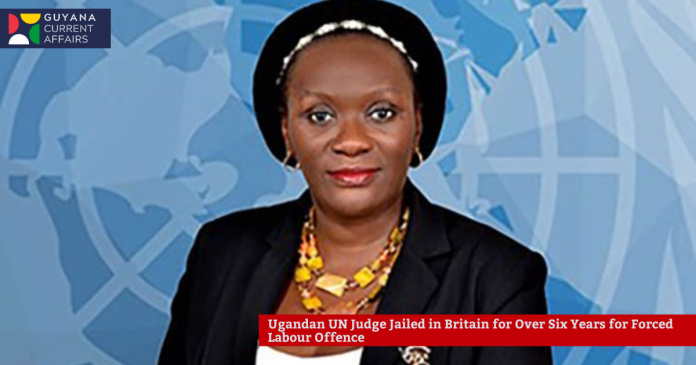Lydia Mugambe, a prominent Ugandan judge and member of the United Nations International Residual Mechanism for Criminal Tribunals, was sentenced on Friday to six years and four months in a British prison after being found guilty of forcing a young Ugandan woman to work as an unpaid domestic servant in Oxfordshire.
The Oxford Crown Court heard that Mugambe, 50, exploited her status and legal expertise to lure the victim to the UK in 2022 under false pretenses. The woman, who cannot be named for legal reasons, was told she would be working at the residence of Uganda’s deputy high commissioner in London. Instead, she was taken directly to Mugambe’s home, where she was forced to perform household chores and childcare duties without pay while Mugambe pursued her PhD studies at the University of Oxford.
Prosecutors described Mugambe’s actions as a “most egregious” abuse of power. The court was told that she conspired with John Leonard Mugerwa, then Uganda’s deputy high commissioner, to facilitate the victim’s entry into Britain by providing false information on her visa application. In exchange for his assistance, Mugambe agreed to help Mugerwa with a legal case in Uganda. Mugerwa was not prosecuted due to diplomatic immunity.
Mugambe was convicted in March on four counts: conspiring to breach UK immigration law, facilitating travel for exploitation, requiring a person to perform forced or compulsory labour, and conspiracy to intimidate a witness. The court also heard that she attempted to intimidate the victim to prevent her from testifying.
During sentencing, Judge David Foxton noted Mugambe’s lack of remorse, stating, “You have exhibited no remorse for your actions. Instead, you continue, unjustifiably, to portray yourself as the victim.” The victim, in a statement read to the court, described living in “almost constant fear” and said she could not return to Uganda due to Mugambe’s powerful standing in her home country.
The case has drawn international attention, given Mugambe’s high-profile legal career, which included work on human rights and war crimes tribunals. The United Nations tribunal has indicated it will take all necessary administrative measures to safeguard its integrity in light of the conviction.
Mugambe’s conviction and sentencing mark a significant moment in the fight against modern slavery and forced labour, highlighting the vulnerability of domestic workers and the responsibilities of those in positions of power.


